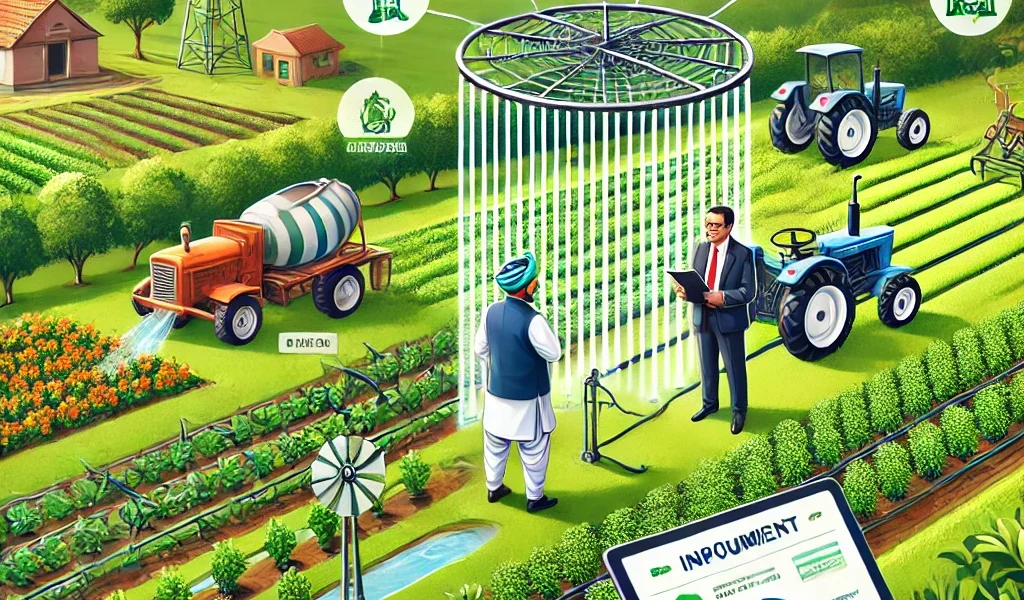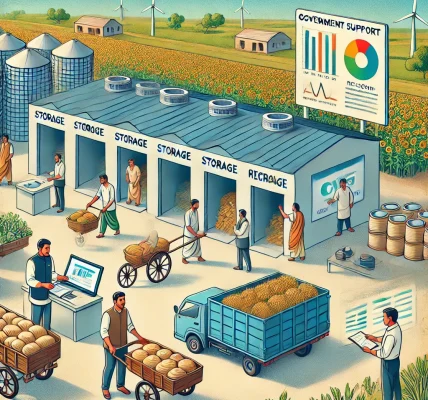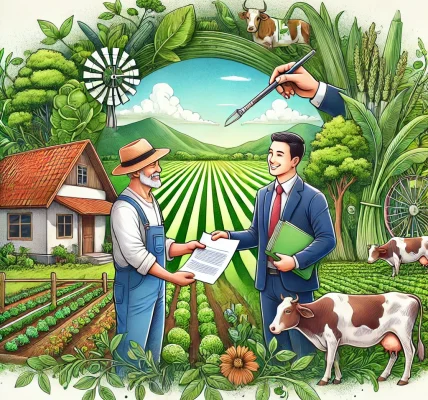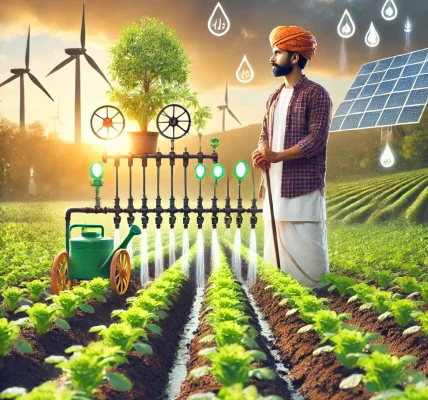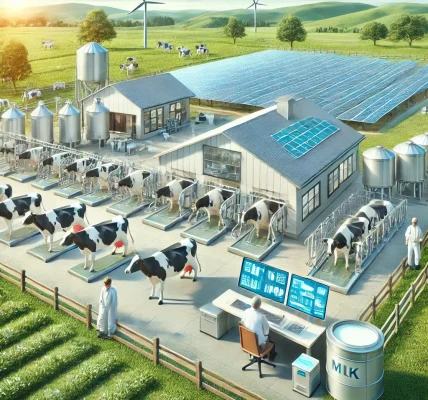Introduction
India, being an agrarian economy, heavily relies on irrigation for its agricultural productivity. However, traditional irrigation methods often lead to excessive water consumption, inefficient distribution, and low crop yields. Recognizing these challenges, the Government of India has launched various smart irrigation schemes that promote sustainable water usage, improve productivity, and enhance farmers’ income.
This article explores the benefits of government-backed smart irrigation systems, various subsidy programs, and the application process to help farmers maximize their water resources efficiently.
What is Smart Irrigation?
Smart irrigation systems leverage technology-driven solutions such as drip irrigation, sprinkler systems, soil moisture sensors, and automated water distribution to optimize water usage. These systems ensure:
- Efficient Water Management: Minimizing wastage and overuse.
- Improved Crop Yields: Providing adequate moisture at the right time.
- Energy Conservation: Reducing electricity consumption with automated controls.
- Cost Savings: Lower operational costs compared to traditional methods.
Key Government Schemes Supporting Smart Irrigation
The Government of India has introduced multiple subsidy programs and schemes to encourage the adoption of smart irrigation systems. Below are some of the most impactful initiatives:
1. Pradhan Mantri Krishi Sinchayee Yojana (PMKSY)
PMKSY is a flagship scheme launched to ensure “Har Khet Ko Pani” (Water to Every Field) and improve water-use efficiency through micro-irrigation techniques.
Benefits:
- Subsidy up to 55% for small and marginal farmers.
- Subsidy up to 45% for other farmers.
- Support for drip and sprinkler irrigation systems.
- Encourages rainwater harvesting and groundwater recharge.
Eligibility:
- Farmers, self-help groups (SHGs), farmer producer organizations (FPOs), and cooperatives.
- Must have cultivable land and an existing water source.
How to Apply:
- Farmers can apply online through the PMKSY portal (pmksy.gov.in) or visit their nearest agriculture department office.
2. Per Drop More Crop (PDMC) Scheme
PDMC is a sub-scheme under PMKSY that specifically focuses on micro-irrigation methods like drip and sprinkler irrigation.
Benefits:
- Financial assistance of 55%-90% for micro-irrigation adoption.
- Encourages precision farming by ensuring crops get the right amount of water.
- Enhances soil fertility by reducing water logging and salinity.
Eligibility:
- Individual farmers, groups of farmers, and FPOs.
- Farmers with a valid land record and proof of water source availability.
How to Apply:
- Visit the PMKSY website or apply through the nearest Krishi Vigyan Kendra (KVK).
- Contact local agricultural extension officers for assistance.
3. Rashtriya Krishi Vikas Yojana (RKVY) – Smart Irrigation Component
RKVY promotes modern irrigation infrastructure to boost agricultural productivity.
Benefits:
- 60% subsidy for the installation of smart irrigation equipment.
- Training and capacity-building programs for farmers on technology adoption.
- Encourages solar-powered irrigation pumps to reduce energy costs.
Eligibility:
- Small and marginal farmers, cooperatives, and farmer producer organizations.
- Must be engaged in irrigated agriculture or have plans for irrigation infrastructure.
How to Apply:
- Applications can be submitted via state agriculture department portals or district agricultural offices.
4. Subsidy on Solar-Powered Irrigation Pumps (PM-KUSUM)
The Pradhan Mantri Kisan Urja Suraksha Evam Utthaan Mahabhiyan (PM-KUSUM) aims to promote solar energy in irrigation.
Benefits:
- Financial aid covering up to 90% of the cost for solar pumps.
- Reduction in electricity costs by shifting to renewable energy.
- Encourages off-grid solar solutions for remote areas.
Eligibility:
- Farmers with irrigation needs and landholding records.
- Applicants must not have an existing grid connection for irrigation.
How to Apply:
- Farmers can apply via mnre.gov.in (Ministry of New & Renewable Energy) or state renewable energy departments.
Advantages of Smart Irrigation Systems
1. Water Conservation
Smart irrigation minimizes water wastage by delivering precise amounts needed by crops, reducing over-irrigation and water loss.
2. Improved Crop Productivity
By providing consistent moisture levels, crop health and yields improve, leading to higher profitability for farmers.
3. Reduced Labor and Energy Costs
Automation in irrigation reduces the need for manual labor and optimizes electricity usage, cutting operational expenses.
4. Climate Resilience
With unpredictable rainfall patterns due to climate change, smart irrigation provides a stable water supply, ensuring continuous farming operations.
Challenges in Adopting Smart Irrigation & Solutions
Challenges:
- High Initial Costs: Advanced irrigation technology requires upfront investment.
- Lack of Awareness: Many farmers are unaware of subsidy programs.
- Technical Barriers: Limited knowledge about installing and maintaining smart systems.
- Water Source Dependency: Some farmers lack proper water sources for irrigation.
Solutions:
- Government Subsidies: Utilizing schemes like PMKSY and RKVY to offset costs.
- Training & Awareness: Conducting workshops through Krishi Vigyan Kendras (KVKs).
- Community-Based Solutions: Encouraging farmer producer organizations (FPOs) to invest collectively.
How to Apply for Government-Backed Smart Irrigation Schemes
Step 1: Gather Required Documents
- Land ownership proof.
- Aadhaar card and bank details.
- Proof of water source (borewell, pond, or canal).
- Application forms (available on scheme portals).
Step 2: Choose the Right Scheme
Based on the type of irrigation required (drip, sprinkler, or solar-powered), select the relevant government scheme.
Step 3: Submit Application
- Online via respective scheme websites (PMKSY, NABARD, MNRE).
- Offline through district agriculture offices or Krishi Vigyan Kendras (KVKs).
Step 4: Verification and Approval
- Officials conduct site inspections.
- Approved beneficiaries receive direct bank transfers or subsidized equipment.
Conclusion
Smart irrigation systems are transforming Indian agriculture by ensuring efficient water use, enhancing productivity, and reducing costs. With strong government support through PMKSY, RKVY, PM-KUSUM, and PDMC, farmers can adopt advanced irrigation technologies with financial assistance.
By leveraging these government-backed schemes, farmers can secure a sustainable future, increase profits, and contribute to India’s agricultural growth.
